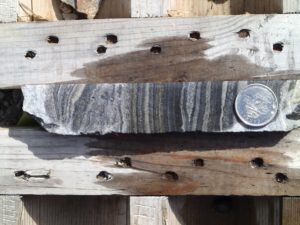Fireweed bids to show potential of Yukon zinc project

Drill core from the Tom West Zone showing layers of zinc and lead rich mineralization.
By Peter Kennedy

With backing from a major zinc producer, Fireweed Zinc Ltd. [FWZ-TSXV] says it is planning a summer drill program that will focus on regional exploration around its Macmillan Pass zinc-lead-silver project in the Yukon Territory of northwest Canada.
The plan is to show that Macmillan Pass is truly a district-scale project, one that could eventually be a source of feed for a British Columbia smelting complex held by with Teck Resources Ltd. [TECK.B-TSX; TECK-NYSE], the Canadian mining giant which recently increased its stake in Fireweed to 9.9%.
In a move that Firewood CEO Brandon Macdonald described as a huge vote of confidence in Macmillan Pass, Teck upped its stake in Fireweed by participating in a private placement financing that raised $5 million for the Vancouver-based junior. Part of the proceeds are earmarked for drilling at Macmillan Pass.
Located in the eastern edge of the Yukon, 350 km northeast of Whitehorse, Macmillan Pass is thought to be one of the world’s leading undeveloped zinc projects. According to a NI 43-101 technical report, the project hosts an indicated resource in the Tom and Jason zones of 11.21 million tonnes of 9.61% zinc equivalent or 6.59% zinc, 2.48 g/t silver, including 1.63 billion pounds of zinc, 610 million pounds of lead and 7.69 million ounces of silver.
On top of that is an inferred resource of 39.47 million tonnes of 10% of zinc equivalent, including 5.845 zinc, 3.14% lead, 38.15 g/t silver or 5.08 billion pounds of zinc, 2.73 billion pounds of lead and 48.41 million ounces of silver.
A Preliminary Economic Assessment announced in May 2018 stated that the ore material can sustain a mining operation for 18 years where average yearly contained metal production would be 85,000 tonnes of zinc, 48,000 tonnes of lead and 2 million ounces of silver. The total project cost is estimated to be $1.05 billion, including pre-production capital expenditures of $404 million.
Back in November 2018, Fireweed said it had struck a deal with Teck to acquire a large zinc property on the western extension of Macmillan Pass. Under the deal with Teck, Fireweed pledged to acquire a 100% interest in the Nidd mineral claims in return for 1.5 million Fireweed shares paid to Teck. The deal gives Teck a 1% net smelter return royalty on future production from Nidd. The major also retains the right of first refusal to purchase future production concentrates from the Nidd property.
Macdonald said Teck’s subsequent participation in the $5 million private placement financing is a big vote of confidence.
“Part of the angle for them was securing additional long term feed for their smelting complex,” he said. “It would be relatively easy to get our concentrate from site to rail head in British Columbia and take it to down to Trail, British Columbia where their smelting complex is located.
A Preliminary Economic Analysis dated May 2018 has concluded that Macmillan Pass contains a substantial zinc, lead and silver resource that can be mined by open pit and underground methods and recovered with conventional flotation processing. Based on the assumptions used for the PEA, the project is economic and should proceed to the pre-feasibility stage, a move that is expected to cost approximately $10.3 million.
The PEA stated it is likely that project economics can be improved via the identification of additional mineral resources within the development area that may justify increased mine production or extend the mine life.
Meanwhile, Fireweed will be working this summer to prove that MacMillan Pass has district-scale potential. “We have a few zones that have known intersections that were not in the last resource,” Macdonald said. “So we are looking to build those out and understand what the resource implications are of that too.”
He said the company hopes to complete roughly 4,000 metres of drilling in 20 holes. These will not be deep holes, however.
“With this more subdued market right now and a lower budget, we are sticking to the shallower stuff,” Macdonald said.
The long awaited closure of several large scale operations in recent years sent the price of zinc soaring last year from a low of US$0.66 a pound in early 2016. However, Scotiabank has said it expects prices to average US$1.25 a pound this year, down from the 2018 average of US$1.33.
Analysts said the softer outlook is driven by rising inventories and concerns about rising supply from Chinese smelters after miners agreed to a sharp rise in treatment and refining charges.
